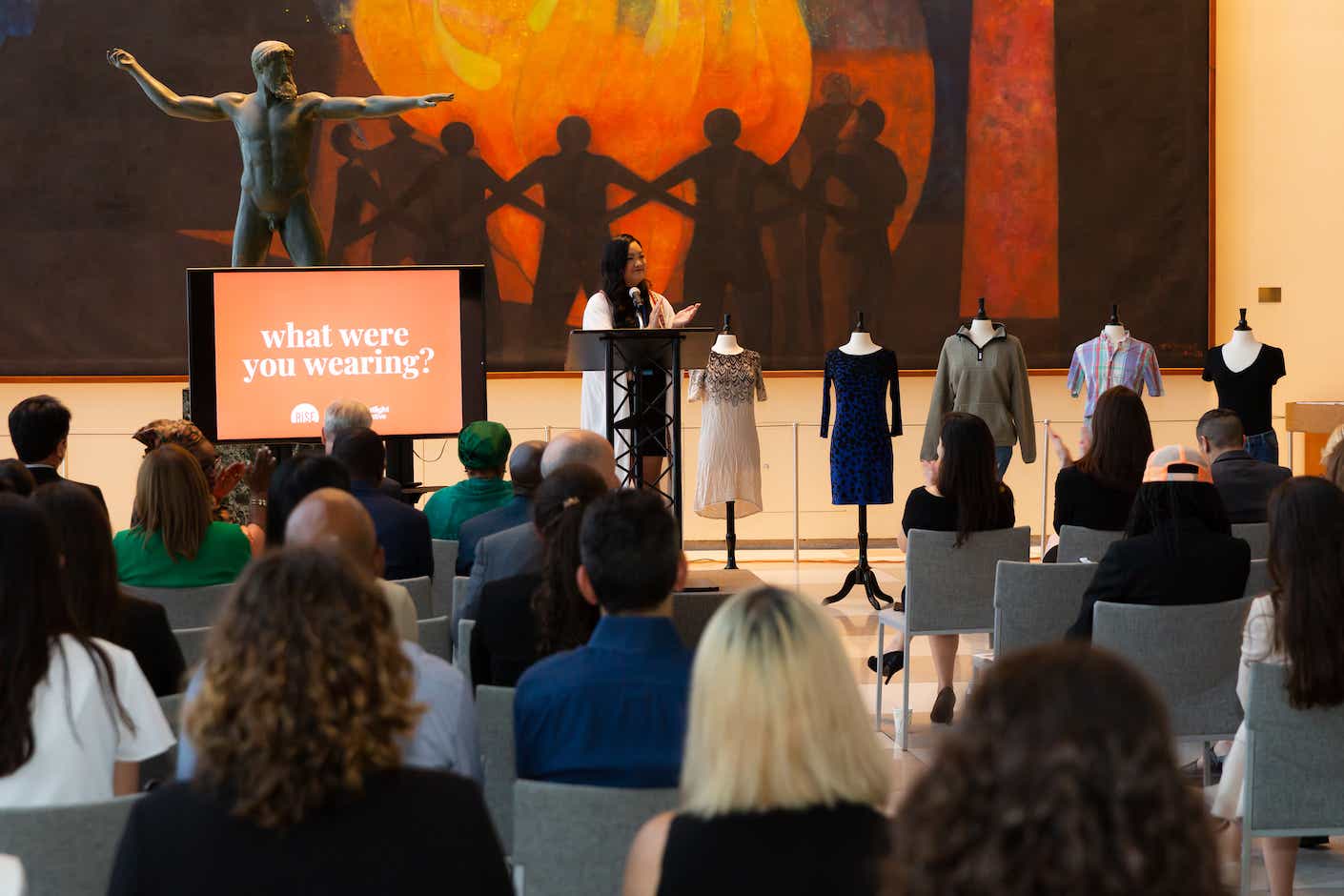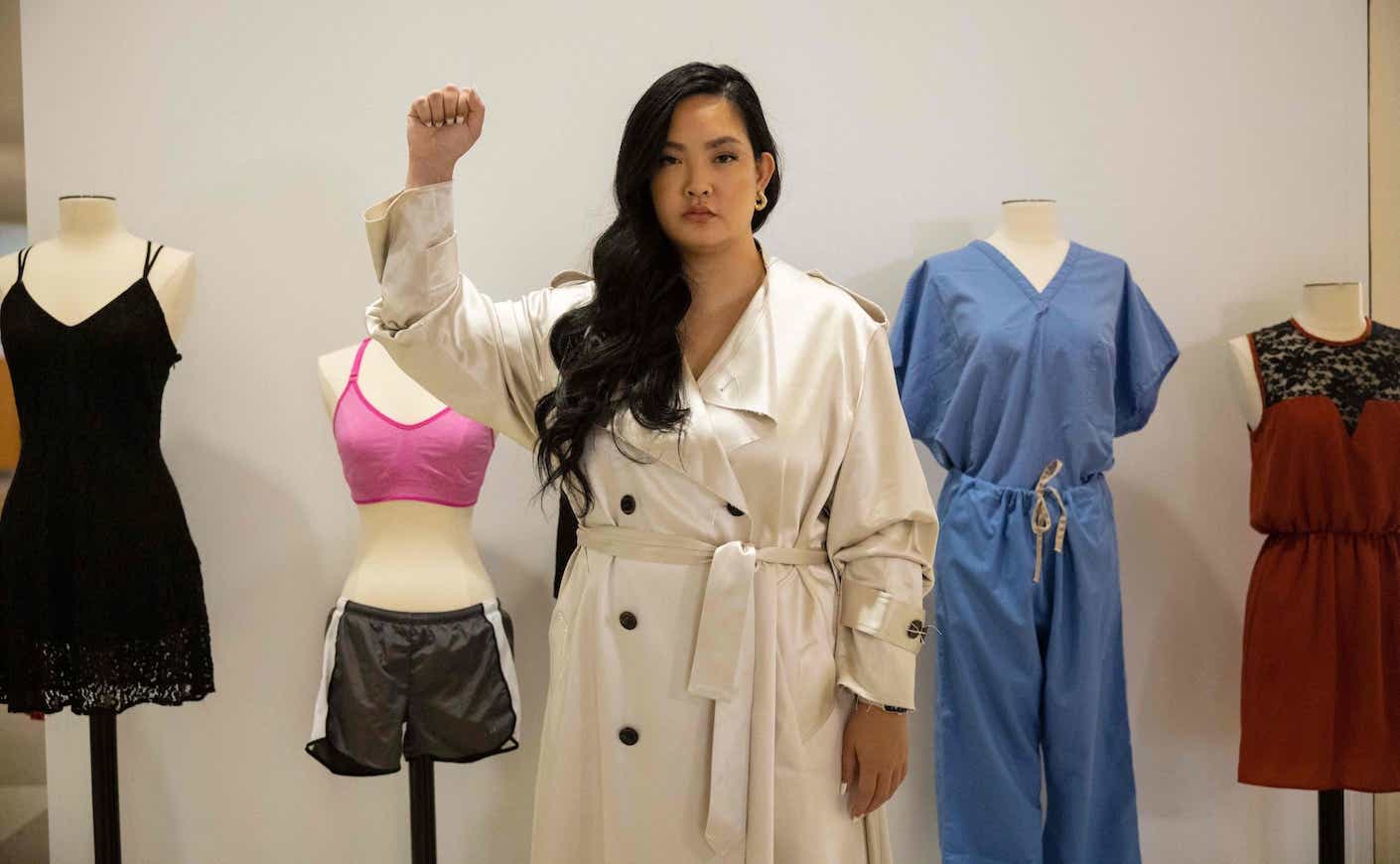How Fashion Week affected my fight for sexual assault survivors’ rights.
I remember attending my first New York Fashion Week (NYFW) show in 2019: Stepping onto streets lined with velvet ropes, and catching glimpses of people wearing the latest styles, I was often asked the question, “What are you wearing?” Suddenly, I stopped in my high-heeled tracks as I realized why that question sounded familiar: I’d been asked a similar question once, but those words had been used in a dramatically different context. The question I was asked was, “What were you wearing?”And it’s what the police asked me after I was raped.
Imagine being physically attacked, and afterward, you go to the police for help. You describe the violence that was inflicted on you, only for them to turn the tables around and blame you for the assault on your body. That’s what’s implied by the question “What were you wearing?” And it’s unfortunately one that many survivors hear after their assault, including me. The question re-traumatizes and blames us for the crime perpetrated against us — and it led me to start my non-profit organization, Rise, in 2016, to fight for survivors’ rights.

The justice system failed me, and my rape kit was set to be wrongfully destroyed as Massachusetts would routinely destroy kits after six months even though the statute of limitations was up to 20 years.
That’s when I decided to rewrite the law. I drafted the Sexual Assault Survivors’ Bill of Rights to ensure the more than 25 million rape survivors across the country would have access to the basic rights necessary to pursue justice. This bill of rights includes informative rape kit procedures and notification, the right to terminate all legal ties with the assailant and the retention of all rights regardless of whether assault is reported to law enforcement.
In 2016, the Sexual Assault Survivors’ Bill of Rights passed through one of the most politically polarized Congresses in American history to become one of the few unanimous acts of legislation in recent memory. Since then, Rise has trained and organized with survivors and allies in all 50 states, leading to the passage of 67 state-level laws for rape survivors to date.”
After my revelation from NYFW, I thought, What if survivors could reclaim that question in celebration of our resilience? That’s how “What were you wearing?” became the theme for the first-ever Rise-produced NYFW Survivor Fashion Show in 2021. Survivors and celebrity allies walked the runway to highlight the plight of survivors and the need for access to justice. The show brought together a community of advocates, stars, and diplomats to advance global survivors’ rights. It served as an advocacy tool for Rise, and helped secure a new agenda item for survivors at the United Nations General Assembly and the 2022 show immediately followed the unanimous adoption of the first-ever UNGA Resolution for survivors of sexual violence during peacetime.
Rise’s third annual NYFW Survivor Fashion Show took place at Forbes on Fifth on the evening of September 11, 2023. There, survivors and allies shared the prestigious NYFW runway — in beautiful pieces by designers and brands like Brunello Cuccinelli, Chloe, and Prabal Gurung. The night was a celebration of confidence, creativity, and self-expression. I told my story, and the J Chen Project performed a dance piece that was followed by spoken-word poetry by Amanda Rose, and a musical performance by Lily Kershaw.
Creating Rise and the Survivor Fashion Show has helped us promote our efforts and raise awareness of what needs to be done to support survivors, and it’s served as a platform for victims to stand up to this system. Personally, it’s been pivotal to my healing journey. Every time I walk down that runway during these shows — this year in a stunning crisp white gown with caped sleeves — I feel my strength. The show is a reminder that we as survivors can reclaim our stories and our agency after feeling completely powerless and alone. Now, I reflect on the question of “What Were You Wearing” with joy and hope for a world that can better protect and uplift survivors like me and beyond me.
At the 2023 show, we unveiled the next step in the fight to end sexual violence: universal jurisdiction. As defined by the Center for Justice and Accountability, Universal Jurisdiction is an international policy that recognizes “certain crimes are so serious that the duty to prosecute them transcends all borders…such as crimes against humanity, war crimes, genocide, and torture.” Following in the footsteps of our successful campaign for a UNGA Resolution for survivors, Rise aims to work with government leaders to establish a multilateral treaty for universal jurisdiction over sex crimes. This would ensure that the international community acknowledges the ubiquitous nature of the harms caused by sexual violence. Justice should not depend on geography — and healing from sexual violence must be accessible to all.
Amanda Nguyen is the CEO and founder of Rise, a social movement accelerator, and a 2019 Nobel Peace Prize nominee; to get involved with Rise’s global fight to advance survivors’ rights, visit their website.








